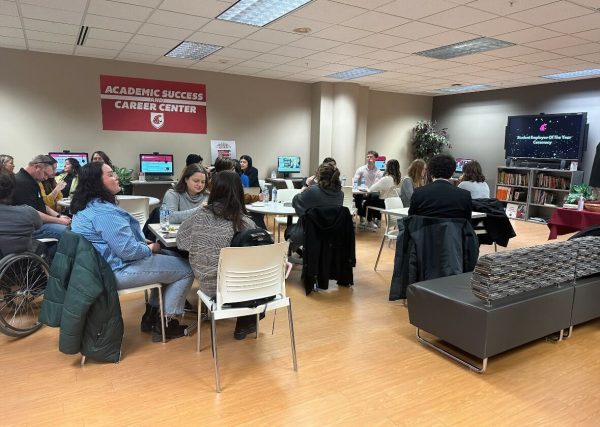Pulitzer-Prize winning reporter sheds light on environmental issues with students and faculty
October 21, 2015
Women using contraception help save mountain gorillas, a room of WSU students and faculty learned Tuesday evening.
Facts like this, related to population growth, poverty and global environments, were shared by Pulitzer Prize-winning journalist Kenneth R. Weiss during his presentation titled “Beyond 7 Billion: Why an environmental reporter decided to write about population growth,” in Honors Hall, Room 110.
One of the primary connections drawn during the presentation was between family planning and the mountain gorilla population of Uganda.
“You pull on one strand and you find it is threaded through all these issues,” Weiss said. “The one common strand is women in power or a lack of power.”
On an expedition to the southwest corner of Uganda, Weiss was introduced to a wildlife veterinarian Gladys Kalema-Zikusoka. She works with the local community to reduce risk of human and gorilla disease transmission.
After the death of an infant gorilla from the human disease scabies, Kalema-Zikusoka took a new approach to conservation by leaving her government position and beginning a nonprofit organization Conservation Through Public Health (CTPH).
Through her work, more than half the women are on family planning, which is above the international average of 30 percent. This in turn lowers the number of gorilla illnesses transferred from humans.
Kalema-Zikusoka created in-home clinics and trained the residents in basic healthcare so they could provide injections of Depo Provera, a hormone contraceptive shot given every three months.
“I realized what was good for this family and this woman on a deeply personal level was also good for the forest and the environment,” said Weiss.
Weiss’s presentation is one in a series of science communication events the Center for Environmental Research, Education and Outreach (CEREO) is sponsoring this week.
“It is central in a lot of environmental problems [population growth],” said Stephanie Hampton, director of CEREO. “It puts stress on the environment and stresses our resources.”
Weiss formerly believed population growth was specifically an environmental issue; through his research around the world, however, he found that places with the most rapid growth correlates to where women have the fewest rights.
In Weiss’s presentation, he covered several locations where women have limited or no access to contraceptives.
“We have been eager to share our knowledge and technological advances to improve food supply and save lives,” said Weiss. “But we’ve been really squeamish about sharing contraception.”
In 2014, the United Nations Population Fund estimated there are 225 million women in poor and developing countries who want to avoid pregnancy but are not using modern contraception.
When discussing Weiss’s central question, “Can we live within our means on this planet?” junior communication major Micah Peyron, one of the students who attended the event, said she believes human rights will continue to be a bigger issue.
Elaborating on how the lecture question impacted her and others in attendance, Peyron discussed the growing job field in science communication.
“If going green is your passion, this is the place you want to be,” she said.
Weiss never thought an environmental journalist like himself would become involved with women’s empowerment and family planning.
“However, that’s what the evidence shows will make a big difference in the future,” Weiss said. “It’s not a complete fix to all the problems we face, but it’s a critical first step.”





















